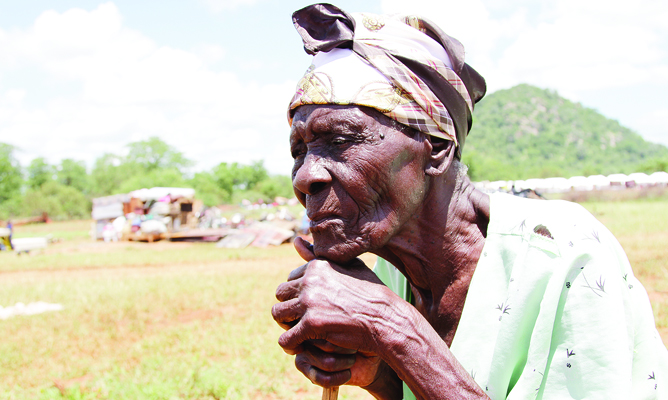
A motley group of male and female elderly people are spotted basking in the sun at Ida Wako Old People’s Home in Marondera as they wait for their sole meal of the day to be served. At the other end of the premises, the home’s workers are running around conducting their daily duties of ensuring that the senior citizens are well taken care of.
BY JAIROS SAUNYAMA
However, to the caregivers, it is a daunting task as government has not been forthcoming in unveiling funds to support the older persons in the country.
Pastor David Zulu of Christian Marching Church, who is the administrator of Ida Wako Old People’s Home, told this paper that they last received a grant from government in February this year and that all along they have been operating on donations from well-wishers.
“We last received institutional grants in February this year. The money is given to each person and we received around $260 for the older persons who live here. We are surviving on donations from local churches, schools and other well-wishers,” said Zulu, whose institution houses about 23 elderly people.
Section 82 of the new Constitution provides that people aged over 70 have a right to receive reasonable care and assistance from their families and the State, to receive health care and medical assistance from the State and to receive financial support by way of social security and welfare.
This is, however, not the case in Marondera only, but a number of old people’s homes in the country are operating on a thin budget jeopardising the welfare of the elderly.
John Mutikizizi, a philanthropist who founded Mutikizizi Old People’s Home, located at the heart of rural Bikita, said government has not been consistent with paying the little money to benefit the elderly.
- Chamisa under fire over US$120K donation
- Mavhunga puts DeMbare into Chibuku quarterfinals
- Pension funds bet on Cabora Bassa oilfields
- Councils defy govt fire tender directive
Keep Reading
He said he resorted to selling some of the goods donated to supplement the institution’s financial coffers.
“There is no money from government, they used to pay each older person monthly, but they have since stopped. We are waiting for the money to come. For now I am loaning donated goods to villagers. For example, if one needs a shirt and doesn’t have money, he will pay the for the item with interest,” said Mutikizizi.
Adonis Faifi, a programmes manager at HelpAge Zimbabwe, a leading national organisation catering for the needs of senior citizens, bemoaned government’s lack of commitment towards senior citizens.
“The government of Zimbabwe is not actually taking care of the older people in the country. We are basically advocating for the introduction of a universal pension for all older persons in Zimbabwe and government is yet to adopt that.
“We adopted the UN (United Nations) definition which is anyone 60-years-plus, becomes an older person. We are saying that everybody who is now 60 years and above should be able to get some assistance from the government.

According to a survey we have just conducted, a number of old people are having a single meal per day while some lack blankets to keep them warm this winter.
“We are aware of the economic crisis, but government should prioritise this age group. For example per dollar that is paid at a tollgate, government should sacrifice a cent towards the upkeep of older people,” said Faifi.
According to HelpAge, there are an estimated 800 000 older persons in Zimbabwe, that is about 7% of the total population.
Most of the older people in the country hail from Malawi, Zambia and Mozambique.
“The greater number of old people in Zimbabwe is mainly constituted by foreign nationals from countries like Malawi, Mozambique and Zambia. For example, during the civil unrest in Mozambique, a lot crossed the border and worked in farms. After retiring they had nowhere to go and ended up in old people’s homes,” said Faifi.
Nelson Langeveldt (77) at Zororai Old People’s Home in Mutare had no kind words as he accused the government of failing its pledge to assist the elderly with monthly grants.
“These old people need some money of their own, they need to drink beer and visit their relatives and they cannot do that because there is no money.
“All over the world, the elderly get grants from the government. Our government is full of people who are still working even beyond their retirement age, what for? They should retire and enjoy some of the benefits, but because they are aware of our situation they keep on working.
“A ministry of the elderly should be created to address our plight. I wish for the moment when one senior government official would come and stay at this institution for two days so that he has a feel of what is transpiring to us,” said Langeveldt, a former technician at Harare Municipality.
An official in the Ministry of Social Welfare who declined to be named said government is aware of the plight of elderly persons in the country.
“We are quite aware of the situation facing the senior citizens. But we all know how the economic situation is like for now. Government has been disbursing monthly grants, but we are also aware that we owe some of them their money,” said the official.











